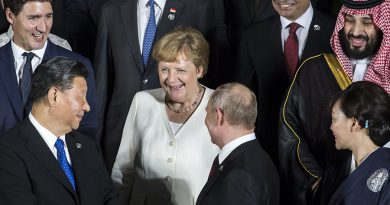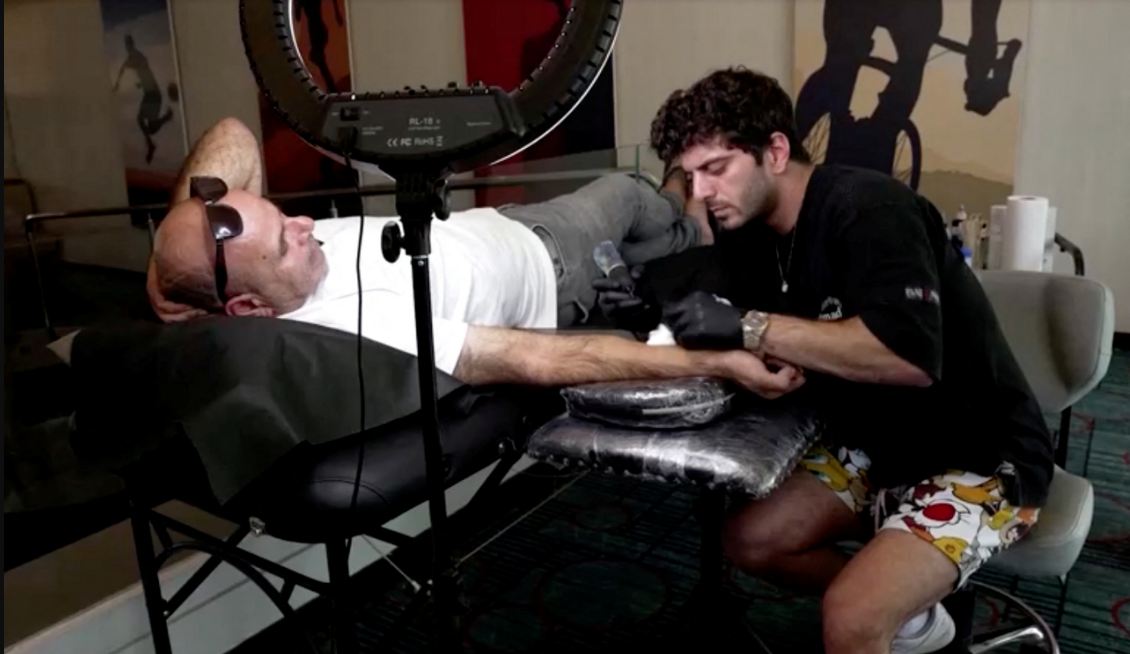Special Report: COVID opens new doors for China’s gene giant
Reuters
As countries scramble to test for the novel coronavirus, a Chinese company has become a go-to name around the world.
BGI Group, described in one 2015 study as “Goliath” in the fast-growing field of genomics research, is using an opening created by the pandemic to expand its footprint globally. In the past six months, it says it has sold 35 million rapid COVID-19 testing kits to 180 countries and built 58 labs in 18 countries. Some of the equipment has been donated by BGI’s philanthropic arm, promoted by China’s embassies in an extension of China’s virus diplomacy.
But as well as test kits, the company is distributing gene-sequencing technology that U.S. security officials say could threaten national security. This is a sensitive area globally. Sequencers are used to analyse genetic material, and can unlock powerful personal information.
In science journals and online, BGI is calling on international health researchers to send in virus data generated on its equipment, as well as patient samples that have tested positive for COVID-19, to be shared publicly via China’s government-funded National GeneBank.
As BGI’s foothold in the gene-sequencing industry grows, a senior U.S. administration official told Reuters on condition of anonymity, so does the risk China could harvest genetic information from populations around the world.
Underpinning BGI’s global expansion are the Shenzhen-based company’s links to the Chinese government, which include its role as operator of China’s national genetic database and its research in government-affiliated key laboratories. BGI, which says in stock market filings it aims to help the ruling Communist Party achieve its goal to “seize the commanding heights of international biotechnology competition,” is coming under increasing scrutiny in an escalating Cold War between Washington and Beijing, Reuters found.
Reuters found no evidence that BGI is violating patient privacy protections where these apply. Responding to questions from the news agency, BGI said it is not owned by the Chinese government.
“Under the current political climate, the fear raised about the use of BGI’s technology is unfounded and misleading,” BGI said in a statement to Reuters. “BGI’s mission is, and has always been, using genomics to benefit people’s health and wellbeing.”
China’s foreign ministry said in a statement the country has been open, transparent and responsible in “sharing information and experience with the international community, providing supplies to relevant countries” including COVID-19 test kits and protective equipment, and helping countries improve epidemic control.
The extent of BGI’s endeavours to dominate an industry with geostrategic value, as well as of its efforts to gather genetic data from around the world, was pieced together by Reuters from public documents and dozens of interviews with scientists, researchers and health officials.
Some U.S. officials warn of a dual risk to national security from BGI: Sensitive genetic information about U.S. citizens may fall into foreign hands, and American companies stand to lose their innovative edge in the field of genomics to Chinese firms.
Earlier this year, the U.S. National Counterintelligence and Security Center (NCSC) published practical tips for health services to avoid “potential threats posed by foreign powers” in connection with COVID-19 tests. Other officials draw parallels between BGI and Huawei Technologies Co., the Chinese telecommunications titan whose 5G technology the United States says could be used to capture personal data that Beijing could exploit. Huawei has said it would refuse to cooperate with spying.
Sharing data is essential for medical research. But in the case of genetic data, officials and scientists say the risks are that it could be weaponized.
Individuals can be identified by a portion of their DNA, and some researchers have found genetic links with behaviours such as depressive disorder. A hostile actor could use such data to target individuals for surveillance, extortion or manipulation, according to a comprehensive report prepared for the U.S. Office of the Director of National Intelligence by science and medical experts in January, which added that such associations are not yet well understood.
Knowledge of the genetic makeup of national decision-makers or the military, and their propensity to act in certain ways, could be used by adversarial intelligence agencies as a mechanism of influence, said the report, “Safeguarding the Bioeconomy,” from the National Academies of Sciences, Engineering and Medicine. Genetic data could reveal a U.S. vulnerability to specific diseases, it added.
As companies race to develop and patent biological drugs for the global market, the ethnic diversity of the U.S. population makes U.S. genomic data more valuable than data from countries with homogeneous populations, the report said. That’s because the more varied the data, the bigger the advantage in identifying genetic disease. The report raised the possibility BGI could amass DNA sequence information from U.S. genetic samples that would give it an “asymmetrical” advantage over U.S. firms.
Genetic information, including family medical history, “is of enormous value and can be exploited by foreign regimes for a range of security and economic purposes,” Bill Evanina, director of the NCSC, told Reuters in response to questions about Chinese genomic companies.
BGI and Huawei have said they work together. In a video that is no longer available on Huawei’s site, a BGI executive said it processes “staggering volumes of data” from its gene sequencers, stored on Huawei’s high-powered systems. In response to questions from Reuters about whether this information could be shared with China’s government, Huawei said only users of its technology can define who to share data with. “Huawei’s Cloud technology and cloud computing services are secure and compliant with international security standards,” it said, adding it complies with all laws.
BGI said it does not have access to patient data from its diagnostic tests.
The company said it is conducting scientific research on the genomes, or genetic blueprints, of the virus and patients with COVID-19. But it said this research is separate from the tests it provides to other nations to diagnose COVID-19.
Asked about China’s genomics ambitions, a U.S. State Department spokesman said: “We believe countries need to be able to trust that vendors will not threaten national security, privacy or intellectual property. Trust cannot exist where a company is subject to an authoritarian government, like the People’s Republic of China, that lacks prohibitions on the misuse of data.”
From “Who1” To Fire Eye
BGI was involved in China’s response to the coronavirus from the start. Its scientists were among teams that sequenced the virus genome and shared that information in January.
On Dec. 26, BGI collected and tested a throat swab from a 44-year-old man who was a patient in the military hospital in Wuhan, according to a record of the sequence that was shared with other researchers on a global database. The World Health Organisation (WHO) learned of cases of pneumonia of an unknown cause in Wuhan on Dec. 31; the blueprint of the patient’s virus was named WHO1.
The week after that first test, BGI took swabs from another three patients at the hospital who had been to the local seafood market, according to a paper published by Chinese scientists in The Lancet on Jan. 29. BGI sequenced these samples.
By month’s end, the company had designed an automated laboratory for the Wuhan government to massively increase testing. BGI called the design “Fire Eye,” after the ability of China’s fabled Monkey King to see disguised threats.
The labs were replicated in China, and the Mammoth Foundation – a charity established a few months earlier by BGI – started donating tests and laboratories worldwide. By mid-year, BGI’s COVID-19 lab equipment was installed in at least 10 countries thanks to donations by the charity, company statements and local news reports show.
China’s government helped coordinate some of BGI’s deals. The Solomon Islands said it had received a $300,000 cheque from the Chinese embassy, which advised the island nation to buy tests and lab equipment from BGI. China’s foreign ministry said China has done its best to ensure safety and reliability of medical supplies.
Besides donations, BGI has reported lab deals worth hundreds of millions of dollars. As technicians in white protective suits build Fire Eye labs in countries from Australia to Saudi Arabia, BGI Genomics, a listed subsidiary of the group, said last month demand would help boost profits by 700% for the first half of the year to more than $218 million.
Powerful Information
There are two main aspects to BGI’s COVID-19 programme.
First, diagnostic test kits, which come with high-speed processing robots to handle large volumes, work by detecting the genetic material of the virus in a patient’s sample to tell if a person has been infected. BGI says these tests do not give access to patient data.
The second part, which the company offers as an add-on in its marketing materials, is gene-sequencing equipment.
In the pandemic, researchers around the globe are using sequencers to track mutations in the virus, see which mutation is spreading, and choose strains or samples to work with for vaccine development.
Underpinning demand for DNA sequencers is also their role driving a lucrative medical field known as precision or personal medicine.
Rather than seek one-drug-suits-all treatments, precision medicine focuses on how different people’s genes interact with their environment to help predict their risk of disease, or their response to medications.
In July, BGI Genomics, BGI’s listed subsidiary on the Shenzhen stock exchange filed for a $293 million capital hike, telling investors in the filing their support would help it collect as much patient data as possible, “on the human body, genome, people’s living habits and environment, so we can understand more, and diagnose in a more precise way.”
The company also says it plans to promote the Fire Eye labs it rolls out for COVID-19 for precision medicine after the pandemic.
From Customer To Rival
BGI was set up by four scientists in 1999 as a non-profit research body called the Beijing Genomics Institute, to enable China to join a global project to map the human genome. Since 2016, its headquarters have housed and operated the government-funded China National GeneBank, a biorepository of 20 million plant, animal and human genetic samples.
In 2010, BGI received a $1.5 billion loan from the state-run China Development Bank, some of which it used to buy 128 sequencing machines from an American firm, San Diego-based Illumina Inc.
Two years after that, Beijing said in a State Council plan for the bio-industry that it wanted China to develop gene sequencing technology. In 2013, BGI succeeded in buying Illumina’s largest competitor, California-based Complete Genomics, for $118 million. That is now the U.S. research arm of the Chinese group. BGI Group launched its own sequencing equipment in 2015; the group floated BGI Genomics in 2017.
This year, BGI Genomics told investors that it had cost $95 million to sequence a whole human genome in 2001. By 2014, Illumina had announced it reduced the cost to below $1,000. Now BGI could do it for $600.
In May, MGI Tech, the BGI subsidiary that makes DNA sequencers, raised $1 billion in venture capital.
But after BGI indicated it would launch its sequencers in the United States, it ran into a challenge – an accusation of intellectual property violations from Illumina. In June, a U.S. court issued a preliminary injunction banning the sale, distribution or promotion of BGI’s materials and equipment, pending a trial to decide if the technology was copied from Illumina.
Seeking the injunction, Illumina’s lawyers told the court: “BGI plans extreme price cutting and ambitious sales directly against Illumina.”
BGI declined to comment on the case. In court papers, BGI denied infringing Illumina’s patents and asked that parts of the injunction be put on hold while it appealed the ruling. Illumina told Reuters COVID-19 will boost sequencer demand.
“More Valuable Than Gold”
With a price tag of between $20,000 for a portable model and $1 million for a powerful machine, gene sequencers are an important part of a country’s pandemic armoury.
Even before the new coronavirus, in October 2019, Ethiopia’s government said it would establish a genomics lab with equipment donated by BGI. Months later, Illumina donated sequencers to 10 African nations to help monitor the virus, the U.S. company said.
At least five countries worldwide have received BGI’s sequencers with the Fire Eye labs, according to statements the countries or BGI have released. In many cases BGI does not own or operate the Fire Eye laboratories, but simply provides the equipment, the company told Reuters.
For BGI, sequencers offer more than money. It has said they will also help it study the virus in large populations.
One recipient of BGI sequencing equipment is Serbia, the Balkan country where Beijing has invested heavily as part of its One Belt, One Road initiative to open trade links for Chinese companies. Two labs have opened there. Both were donated by Chinese companies, Beijing and Belgrade said.
After the first lab opened, coordinator Jelena Begovic told Reuters in May that DNA sequencers help researchers by linking genetic information on the virus with genetic information on the patient. In future, she said, the labs would underpin cooperation with BGI.
“Information is nowadays sometimes more valuable than gold,” she said. “In that sense, this is also a source of information for them regarding this region.”
Prime Minister Ana Brnabic told an opening ceremony that after the pandemic, “We will have the most modern lab, which will enable us to start talking with BGI on how to build the most advanced institute for precision medicine and genetics in this region.”
Sweden, too, has received sequencing equipment from BGI. The Karolinska Institute, a medical university in Stockholm, hopes to use it to identify a human genotype that is more susceptible to the disease, microbiology professor Lars Engstrand said in a presentation on BGI’s website.
Asked by Reuters about the risk Swedish genomic data may be collected by the Chinese government, Engstrand said this was “a very relevant question” and the institute’s IT security department had scrutinised its collaboration with BGI.
“There will be no sequence information sent to any other servers or computers outside our institute,” said Engstrand, who heads the institute’s Center for Translational Microbiome Research, in an email. “No cloud solution will be used for these sensitive data.”
He was unsure if the institute would go ahead with sequencing human genomes, he added.
“Considerable Support”
Researchers globally are sharing virus data, but BGI has also set up its own sharing platform, the “Global Initiative on Open-source Genomics” for the new coronavirus.
On a website together with the China National GeneBank, giogs.genomics.cn, it invites international scientists to send in virus information including patient age, gender and location, collected in accordance with local regulations.
“You will be asked to share virus genome data to the public via (the National GeneBank) in the first instance,” the site says.
In exchange, the site offers sequencing services and “considerable support” for the cost of kits and reagents.
BGI told Reuters it had received no patient samples under this new programme – samples have been sequenced in local facilities.
It said its goal is to “develop more high-quality genome data of (the) virus with BGI’s sequencing solution.” It said it wants to facilitate the rapid and open sharing of genome data to support research on the virus.
Besides the National GeneBank, BGI’s headquarters also house at least four government-designated “Key Laboratories” for genomic research, which are also government-funded. BGI said this funding is used for research, not operations.
One of the labs supported a study by a dozen BGI researchers who sequenced the genomes of more than 300 COVID-19 patients in a Shenzhen hospital, according to a paper they shared on MedRvix, a website for pre-published scientific papers.
“We and the others are continuing to recruit patients and data in China and around the world to understand the host genetic background underlying the varying clinical outcome of the patients,” the researchers wrote.
As rapid COVID-19 tests are adopted globally, the researchers added, it will be important to study patients who don’t show symptoms. The study’s lead author didn’t respond to questions from Reuters.
Security Apparatus
BGI’s pandemic push comes as tensions between China and the United States are mounting, including over China’s genetic programme.
Two BGI subsidiaries were blacklisted by the U.S. Commerce Department last month for China’s alleged human rights violations. Washington alleged BGI is involved in conducting genetic analysis of Uighur Muslims in Xinjiang in western China, where U.N. experts and activists say Muslims were held in detention centres.
BGI said in a statement it “does not condone and would never be involved in any human-rights abuses.” Chinese officials say the camps are educational and vocational institutions and deny they violate the human rights of the detainees.
China’s security apparatus is a BGI customer. Another BGI subsidiary, Forensic Genomics International, says on its website it works with China’s Public Security Bureau. It had multiple contracts with the police to collect male DNA samples, as well as samples from some newborn babies, a survey this year by the Australian Strategic Policy Institute found.
BGI said the forensics subsidiary complied with scientific ethics and the law. The foreign ministry declined to comment.



